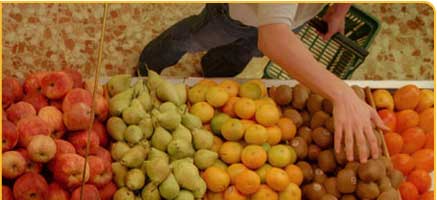



Scientists—like mothers—admonish us to eat fruits and vegetables. And why not?
Research shows that fruits, vegetables and other plant foods are packed with
naturally occurring substances known as antioxidants and phytochemicals, which
help prevent disease and boost the immune system. Some recent findings:
A toast to your tummy
Red wine may protect not only your heart, but your stomach. According to a study
at the University of Missouri-Columbia, red wine and grape juice inhibit the
growth of food-borne bacteria that cause illness but don't harm the bacteria
needed for a healthy digestive system.
Lead researcher Azlin Mustapha says that because the study was conducted in test tubes, it's not certain that the effect will be the same in humans, but achieving similar results looks likely.
"Saint Paul knew what he was talking about when he
recommended that Timothy drink a little wine for his stomach's sake," says
gastroenterologist Howard Spiro, M.D., emeritus professor of medicine at Yale
University. (Findings presented at the 2007 Institute of Food Technologists
conference in Chicago in July.)
Packed peanuts
Consider a handful of boiled peanuts when you're blindsided by a snack attack.
"Both the shell and the red skin of peanuts are loaded with antioxidants," says
Lloyd Walker of Alabama A&M University. "Eating peanuts that have been shelled
and skinned before roasting robs us of these naturally occurring substances,"
but peanuts boiled in the shell absorb the health-promoting antioxidants.
To prove the point, Walker and his colleagues turned their
laboratory into a test kitchen: They boiled raw peanuts in the shell. They also
roasted peanut kernels in oil or dry-roasted them. When they tested antioxidant
levels in the different group, the boiled peanuts won hands down. (Journal of
Agricultural and Food Chemistry, Oct. 31, 2007)
Avid for avocados
In another test tube study, scientists at Ohio State University in Columbus
pitted phytochemicals extracted from avocados against cells that lead to oral
cancer. They found that not only did the extracts prevent precancerous cells
from developing into cancers, they didn't harm normal cells.
"We can't make precise recommendations about how much avocado is beneficial because our work was done in the laboratory and not with people," says lead author Steven M. D'Ambrosio. "But most of us don't eat nearly as many fruits and vegetables as we should." (Seminars in Cancer Biology, December 2007)
What's the secret in greens?
What is it about leafy green vegetables that makes every nutrition expert
repeatedly nag us to eat them? One thing is the chemical nitrite, which the body
stores in the heart and brain. "If a heart attack or stroke occurs, nitrite is
converted to nitric oxide to protect the cells from injury," says David Lefer,
M.D., of the Albert Einstein College of Medicine in New York.
Lefer and his colleagues found that spiking the drinking water of laboratory animals with the amount of nitrite equivalent to a serving of spinach salad significantly limited the damage caused by a heart attack. All leafy greens, including lettuce, are rich in nitrites; so are beets and celery. (Proceedings of the National Academy of Sciences, Nov. 12, online edition)
Yup, rosemary really is for remembrance
From earliest times, people believed that rosemary would improve memory. They
were on the right track. Research done by Stuart Lipton, M.D., of California's
Burnham Institute for Medical Research in La Jolla and his colleagues in Japan
indicates that rosemary's active ingredient, carnosic acid, may protect the
brain from stroke and the ravages of harmful free radicals that contribute to
conditions such as Alzheimer's. In animal studies, the scientists found that
carnosic acid remains dormant until activated by the free radical damage itself.
Although it's too early to tell how much of the herb is
needed, it doesn't hurt to add it your arsenal of ingredients. "It may help the
brain—and it certainly tastes good," says Lipton. (The Journal of Neurochemistry
and Nature Reviews Neuroscience, November 2007)
The goods on garlic
British researchers have discovered why garlic seems to help lower high blood
pressure and foster good heart health. The secret is a substance in garlic
called allicin that interacts with red blood cells to boost the body's level of
hydrogen sulfide.
"This chemical acts as an antioxidant and transmits signals
that relax blood vessels and increase blood flow," says the study's lead author,
David Kraus, of the University of Alabama at Birmingham. The researchers added
fresh garlic to human red blood cells, using a concentration equal to eating two
cloves. For garlic to deliver its full punch, Kraus advises crushing or chopping
it about 15 minutes before use to activate its health-boosting properties.
(Proceedings of the National Academy of Sciences, Oct. 19, 2007, online edition)
Let cinnamon be your friend
If you can't resist dessert after dinner, order a cinnamon-spiked sweet.
Researchers at Malmo University Hospital in Sweden found that blood sugar of 14
healthy volunteers rose much less after they ate rice pudding with a teaspoon of
added cinnamon than when they ate plain-Jane rice pudding.
But diabetics, take heed:
"It's certainly too soon, however, to recommend cinnamon as
a way to control blood sugar if you have diabetes," says Craig I. Coleman of the
School of Pharmacy at the University of Connecticut. "None of the studies that
evaluate cinnamon suggest that it will help control diabetes by any of the
measures we currently use." (American Journal of Clinical Nutrition, June 2007)
Fewer wrinkles
Want fewer wrinkles? Eating oranges may help. A study with more than 4,000 women
ages 40 to 74 reveals that those with diets rich in vitamin C had less wrinkled
skin than women whose diets fell short on vitamin C. Citrus fruits, as well as
strawberries, tomatoes, green peppers and broccoli, are excellent sources of
vitamin C. The researchers, based in England, analyzed data from a study
conducted in the United States between 1971 and 1974.
A reminder: “It's not hard to imagine that a balanced, healthy diet would contribute to skin health," says dermatologist Kathryn Schwarzenberger, M.D., of the University of Vermont College of Medicine. "But many factors play a part, including sun exposure, genes, smoking and general health. Personally, I'd put my money on sun protection!" (American Journal of Clinical Nutrition, October 2007)
Immunity boosters
Researchers already know that when broccoli and its kissing cousins, cabbage,
cauliflower and kale, are chewed and digested they produce a chemical, nicknamed
DIM, that stops the growth of certain cancer cells. But now researchers at the
University of California at Berkeley find that DIM may also help fortify the
immune response, according to the results of a new study in mice.
In addition, Leonard Bjeldanes, the principal investigator, notes that it's well established that plants in this family are also the best source of a wide variety of vitamins. "And the more you eat, the better," he says. (Journal of Nutrition Biochemistry, Aug. 20, 2007, online edition)